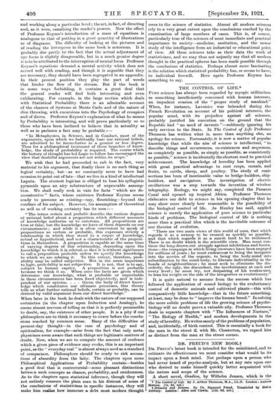THE CONTROL OF LIFE.*
PURE science has always been regarded by myopic utilitarians
as something insufficiently concerned with human interests, an impudent evasion of the " proper study of mankind."
When, for instance, Lavoisier was beheaded during the French Revolution on account of his political interests, the popular mind, with its prejudice against all sciences, probably justified his execution on the ground that the Republic had " no need of savants "—sublimely ignoring his
early services to the State. In The Control of Life Professor Thomson has written what is, more than anything else, an
apology for science. Fortunately, it is now a matter of popular knowledge that while the aim of science is intellectual, " to describe things and occurrences, co-existences and sequences, as completely as possible, as simply as possible, as consistently
as possible," science is incidentally the shortest road to practical achievement. The knowledge of heredity has been applied with great practical advantage to root crops, cereals, and fruits, to cattle, sheep, and poultry. The study of conic sections has been of inestimable value to bridge-builders, ship- builders, and navigators. The investigation of electric oscillations was a step towards the invention of wireless telegraphy. Zoology, we might say, completed the Panama. Canal and opened up tropical Africa. Professor Thomson
elaborates our debt to science in his opening chapter that he may show more clearly how reasonable is the possibility of
the biological control of life. As Huxley has said, applied science is merely the application of pure science to particular kinds of probleMs. The biological control of life is nothing more than a practical idea. which is the inevitable outcome of
our theories of evolution.
" There are two main views of this world of ours, that which regards it as a swamp to be crossed as quickly as possible, and that which regards it as a marsh land to be reclaimed. There is no doubt which is the scientific view. Man must con- tinue the long-drawn-out struggle against inhibitions and limita- tions—the campaign in which living creatures have been engaged for millions of years ; he must endeavorte to bring the inorganic into the service of the organic, to bring the body-mind into subordination to the mind-body, to liberate individuality in the bonds of neighbourliness ; he must seek to eliminate the dis- orderly, the ugly; the discordant, the involutionary at each and every level ; he must try, not despairing of his weaknesses, to lean his weight on the side of the integrative or evolutionary."
It is quite natural to assume from the success which has followed the application of sound biology to the evolutionary control of domestic animals and cultivated plants—this with comparatively little knowledge—that in the future something, at least, may be done to " improve the human breed."- In solving
the more subtle problems of life the growing science of psycho- biology will no doubt prove a valuable ally. Professor Thomson deals in separate chapters with " The Influences of Nurture," " The Biology of Health," and modern developments in the study of heredity. He writes sanely of the problems of population, and, incidentally, of birth control. This is essentially a book for the man in the street if, with Mr. Chesterton, we regard him as distinct from the man at the street corner.


































 Previous page
Previous page